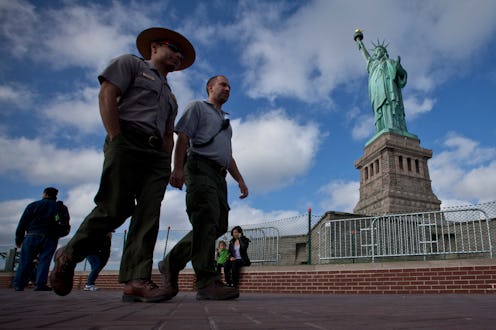News
Here's What Actually Happens When The Government Shuts Down

With the Republicans controlling both the legislative and executive branches, you wouldn't expect a government shutdown to be a possibility. But as long as President Trump continues to feud with congressional leaders about his border wall, it's completely relevant to wonder what happens in a government shutdown.
Trump has been talking about shutting down the government for months, apparently without any understanding or concern for the negative effects that a government shutdown would have both on his party and on the country as a whole. The idea isn't a popular one amongst Republicans in Congress, who realize the potential political costs of pushing forward with funding for the very unpopular wall. Democrats in Congress are also expected to stand strong against allowing any funding to go towards the wall, which many agree would be a completely ineffective solution. Democrats can block any wall funding from going into the necessary spending bill, but then Trump could potentially refuse to sign any spending bill that comes to his desk without funding for the wall in it. Republicans recognize that they would largely take the blame for a shutdown — even if Trump doesn't seem to realize or care about that.
Even as the bickering over the spending bill continues on Capitol Hill, politicians have less to worry about from a potential government shutdown than most of America does. They, after all, will still get their paychecks no matter what — even if their staffers won't necessarily receive theirs. While the political costs could be great to the people who cause the shutdown, that concern pales in comparison to the damage it will cause to the nation's standing and economy.
Approximately 800,000 federal employees will immediately feel the effects of any government shutdown, as all government employees deemed "non-essential" will be furloughed, that is, sent home without the promise of pay. Congress did eventually decide to pay the furloughed workers after the last government shutdown in 2013, but that is in no way guaranteed. The essential staff, such as air traffic controllers, immigration officials, and nuclear safety officials, will continue working — without knowing when they'll get their next paycheck.
Without the non-essential staff on hand, that means that a lot of government services simply cease to function. If the government shuts down at the end of September, don't try to visit anything run by the National Park System and don't expect any cool new science to come out of NASA, because they'll both be shuttered. National Zoo employees will still be able to go keep the animals fed and in good health, but great national symbols such as the Statue of Liberty, the Grand Canyon, and Yellowstone National Park will be closed to any visitors — which will cost the federal government an estimated $76 million a day in revenue. And that's not the only cost to the economy — the shutdown in 2013 cost the national economy a whopping $24 billion over 16 days.
Tourists' ruined vacations and economic losses aren't exactly the most pressing concern, however, when you recall that Texas and Louisiana are suffering from the effects of a natural disaster of massive proportions. FEMA's disaster relief efforts after Hurricane Harvey will continue even in the event of a government shutdown, but their funds are not unlimited. For his part, Trump doesn't seem to connect the Harvey disaster relief with the government shutdown at all.
While disaster relief should currently be at the top of anyone's list of concerns regarding the potential shutdown, the administrative delays the country could face are not insignificant. From public services in D.C. being shut down (including trash collection, not including schools and public transport) to delays in passport application processing, millions of Americans will be negatively affected. People waiting on social security checks or tax refunds might find their money delayed, and government offices that you might view as essential, like the Centers for Disease Control and the National Institute of Health, won't be working at full capacity. If there was a disease outbreak, they would not be able to respond as effectively as usual.
Just like Congress' and Trump's salary, there are some things that won't change. The Postal Service runs on money from stamps and postage, so you'll keep getting your mail. Air travel wouldn't be too heavily affected, as TSA is considered to be essential. The military will continue working, although some monetary benefits for service members and their families would be delayed.
Overall, shutting down the government would be a lose-lose situation for both Trump and the American people, but that seems to be what the dealmaker in chief is gunning for. At least now that you know what to expect if it happens, you can start lobbying your lawmakers to resist it as much as they can.